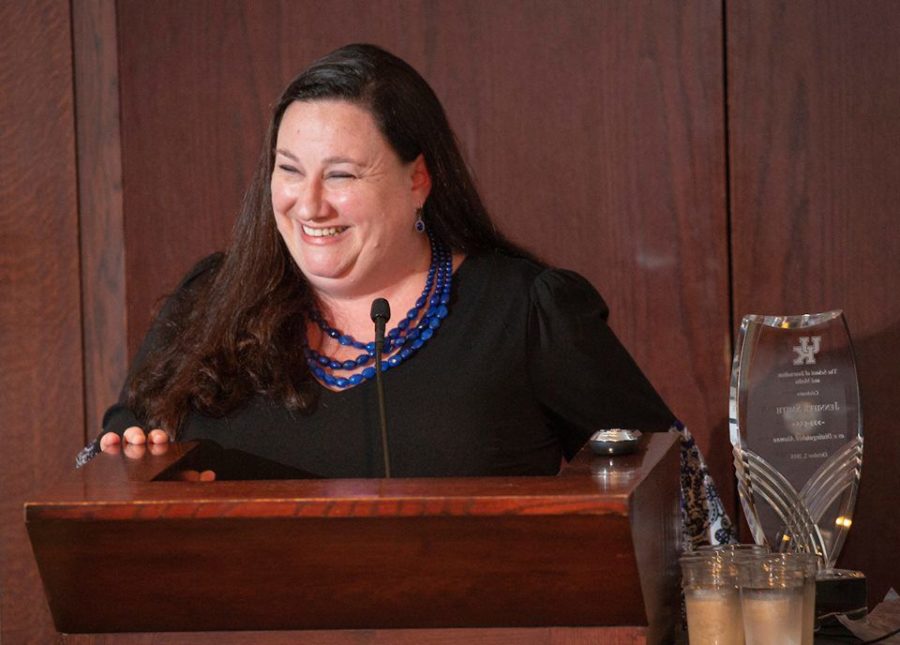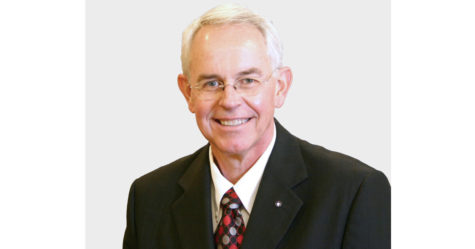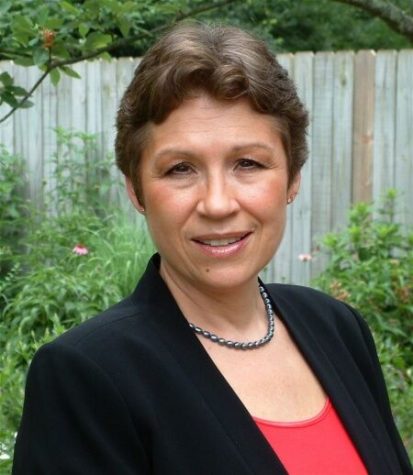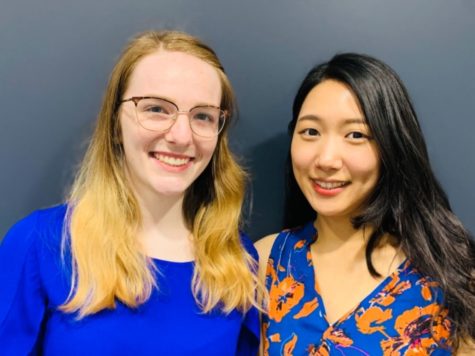UK journalism school honors alumni, First Amendment at annual event
October 3, 2018
Discussions of fake news, the state of journalism and freedom of the press permeated the 13th annual First Amendment Celebration, which was held in the Alumni Association Auditorium at the William T. Young Library on Tuesday night. Six alumni of the School of Journalism and Media were honored in front of students and their former colleagues.
Dr. Mike Farrell, professor and interim director of the School of Journalism and Media, started the evening by welcoming the audience and speaking about the First Amendment.
“Wherever you go in your lives and careers, it is important that you stand up for the First Amendment and for freedom of speech and of the press,” he said.
Farrell then recognized Jeremy Rogers, who, according to Farrell, has made an “outstanding contribution to freedom of speech and of the press in Kentucky.” Rogers graduated from the School of Journalism in 1999 where he worked on the Kernel. He was awarded the James Madison Award.
“The 45 words in the First Amendment are hugely important, obviously, but they’re only worth what we make them,” Rogers said.
Ivan Rome, senior journalism major at UK, introduced Henry “Bub” Asman. Asman, a film editor who graduated from UK in 1971, eventually worked with Clint Eastwood and won two Oscars.
“If you love what you do, you’ll never work a day in your life. It’s not true. We loved what we did, but we also worked our tails off,” Asman said.
McKenna Horsley, managing editor for the Kernel, introduced Barbara Bailey, a longtime anchor and reporter for WKYT, a local television station.
“I think we need to work hard to get that ‘fake’ label removed and remember that we are still the truth seekers out there and it is a very important job,” Bailey said of journalism.
Brady Trapnell, senior journalism major, introduced Lewis Donohew. Donohew received his journalism degree from UK in 1951. Donohew used to be the Director of the School of Communication and Associate Dean of the College of Arts and Sciences.
Bailey Vandiver, editor-in-chief for the Kernel, introduced Angelo Henderson. Henderson, who passed away in 2014, was represented by his wife, Felecia Henderson, who is an assistant managing editor at the Detroit News.
“I always tell reporters, pay attention, be nice to your sources, because you never know when you’ll need them again,” Felecia said.
Erika Bonner, sports editor for the Kernel, introduced Jennifer Smith. Smith, who is the Lexington Herald-Leader’s football beat writer, said part of her job is to “take the helmet off someone and show who they are to the community that is cheering for them.”
The last distinguished alumnus was introduced by Rick Childress, news editor for the Kernel. Warren Wheat graduated from UK, where he worked for the Kernel. Wheat went on to work for many publications, including the Lexington Leader and the Cincinnati Enquirer. Wheat eventually returned to Kentucky to become an editor for The News-Enterprise in Elizabethtown. Wheat retired in 2009 and now works for an organization in Washington D.C., No-Labels.
Judy Clabes, the first winner of the James Madison Award, introduced Walter Grant. Grant is the 13th winner of the James Madison Award.
Clabes ended the introduction by saying, “Listen to what he has to say. It’ll be important, and you’ll be quoting it for years to come.”
Grant told the audience that he would have never been accepted into law school had it not been for his role as editor for the Kernel.
“I think it’s fair to say that journalists today are facing a very difficult and challenging environment,” Grant said.
He added that President Donald Trump isn’t helping journalists, but instead is creating things like “fake news.”
“When the public loses trust in the media, the good journalism gets ignored or discounted… Freedom of the press does not mean that the media is free from criticism,” Grant said. “The freedom enjoyed by the media comes with a responsibility to provide fair, balanced and unbiased coverage of the news.”



















































































































































